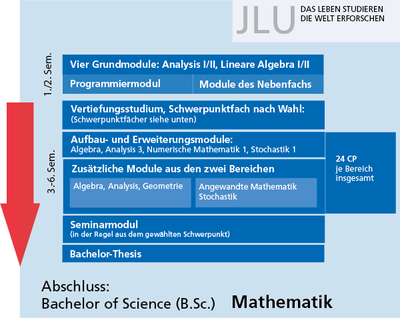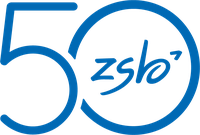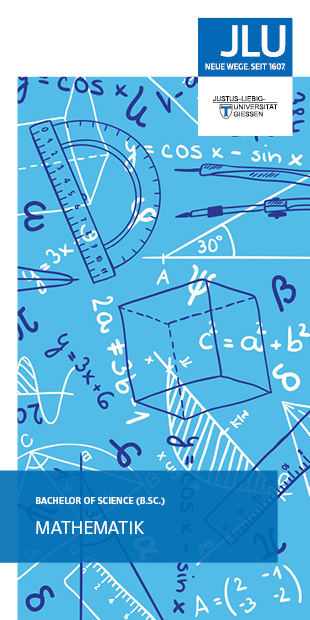Mathematics (B.Sc.)
Taught in German
Overview
- Overview
-
Areas of Study
Mathematics is one of the oldest sciences, first developed from the problems of counting, calculating and measuring. On the one hand it has developed steadily with the current needs and, on the other hand, made many developments and discoveries of our time possible. Through this it has always remained an up-to-date and modern science, the findings of which have an influence in many other areas of study. In its study one acquires, along with a body of other basic mathematical knowledge, a logical-analytical way of thinking – universally applicable and thus of great importance in professional life. This is shown by the good professional prospects which Giessen graduates have had in the past and will have for the near future. Small, manageable classes make an intensive supervision possible from the first semester onwards. The emphasis of the research areas lie, for example, in the areas of stochastic science, cryptography, group theory, dynamic systems, numerical mathematics and informatics.
Study-specific prerequisites
A specialisation in the final year of secondary school in mathematics is helpful but not required.
For all elementary students of this course of study a "Vorkurs Mathematik" (preliminary mathematics course) is offered. Participation is emphatically recommended. More on this...
-
Number of enrolled students
171 students are enrolled in this bachelor degree course (as of winter semester 2017/18).
Accreditation
since 29 September 2006.
Composition of the Study Programme
- Degree BSc
-
Degree
Bachelor of Science (BSc)
- Duration of studies 6 Semester 180 Credit Points (CP)
-
Duration of Studies
6 Semesters - 180 Credit Points (CP)
- Composition of the Study Programme
-
Composition of degree programme

The Bachelors course in Mathematics consists of
- mathematics modules,
- minor subject modules and
- other additional non-mathematical modules.
Mathematics covers about 80% of the degree course.
In the course students must get 180 credit points: 126 in mathematics modules, 12 for the Bachelor`s thesis and the rest for the minor subject modules and one programming module.
Minor subjects
At the moment minor subjects can be:
- Biology
- Chemistry,
- Geography,
- Informatics,
- Philosophy,
- Physics,
- Psychology and
- Economics/Business Administration.
Modules
Basic modules
In the first year the course of study begins with 4 obligatory basic modules covering the prerequisites for all of the rest of the course. The courses are:
- analysis 1 and 2,
- linear algebra 1 and 2.
In addition there is
- a programming module, which is not a mathematics module,
- an introductory seminar course module and
- from the start of the first semester, in each semester the module of the chosen minor subject.
Advanced section of studies
The first year of study is followed by an advanced section of studies (second and third years) including four extension modules:
- algebra,
- analysis 3 (differential equations and theory of functions),
- numerical mathematics 1,
- stochastic science 1
(three modules in the third semester and one in the fifth).
In-depth studies
With the in-depth studies, beginning in the third year, another emphasis is built up on one of the elements of the course:
- algebra,
- analysis,
- discrete mathematics,
- mathematics of finance,
- geometry,
- numerical mathematics or
- stochastic science.
During the phase involving the selection of aspects to be studied in greater detail, there are, together with in depth studies, two modules that must be selected for study from among algebra/analysis/geometry and applied mathematics/stochastic science. In this way 24 credit points can be achieved in these sections together with the 4 obligatory extra in-depth modules.
This is to guarantee an adequate breadth in students’ knowledge of mathematics. The seminar module must also be done, usually this is a module in the selected emphasis.
Bachelor's dissertation
In the 6th semester the thesis, also on the chosen central aspect, is written. It serves to show that the student is capable of independent academic working.
Application
- Commencement of Studies in the Winter Semester
-
Commencement of studies
Only possible in the winter semester
- Entrance Requirements Abitur ohne Praktikumsnachweis
-
Entrance requirements
- Applicants must have an Abitur (German school leaver's examination for university entrance) or equivalent. More on this...
- Certification of a pre-professional practical period is not required.
-
Special regulations apply to foreign applicants or those who gained their university-entrance qualifications abroad. Read more...
- Application not limited only winter
-
-
Application / Enrolment
-
The study programme is not subject to admission restrictions.
-
The enrolment period for the winter semester begins at the beginning of June.
-
The end of the enrolment period is determined anew each year, please enquire in the application portal during the enrolment period.
Different rules apply in some cases for international applicants. More...
-
-
- Application period
-
Please note that the application period for the Bachelor's course can be extended. This information will be published here (in German).
Career Options
- Career Options
-
Programmes of further study at JLU
Career options / job market
One of the typical features of the subject of Mathematics is that its graduates do not have their own sector in the job market. Mathematicians must rely on constantly finding new areas of employment, which is what has actually happened in the past in a most impressive manner. The interest in Mathematics graduates has clearly increased in industry in the last 15 years (in the area of research and development) but also in the economy in general, in insurance and in banking. In many branches of work, Mathematics involves a typically analytical way of thinking, which eminently helps in dealing with complex application problems of all kinds in various areas of work:
- Data processing, insurance mathematics, financial economics, logistics
- Medicine, drug industry, industrial production
- Teaching
- Public service and administration
Detailed information is to be found in the student guide.
Further Information
- Further Information: Documents
-
PDF documents for the courses of study
- Flyer (in German)
- Study guide (in German)
Examination- and study regulations
- Special regulations (in German)
(with module descriptions and module plans) (in English)
(Please note that only the German version of the modules is offical and legally binding. The english Version is for informative purposes only.) - General study regulations for modular and multi-stage study programmes
Courses offered in the course catalogue
- Electronical course catalogue (in German)
- Bachelor's Degree Programmes of Faculty 07
- International pages
-
Please have a look at our International Pages for more information in English.
- Any Questions
-

Any Questions?
Information- and advisory services of JLU can be found under the category “contact” on this page!
- Help
-
Do you need assistance in choosing the right courses of study?
- Offers: Courses of study
-
Which courses of study suits me best?

Ask Justus offers information for prospective students
Events for prospective students

There is a whole range of events offered by JLU, current events can be found under “news”:
www.uni-giessen.de/studium (in German)
Contact
- Contact
- Subject Advisors
- Subject Advisors
-
Prof. Dr. Oleg Davydov
Heinrich-Buff-Ring 44, HRZ, room 117
35392 Gießen
Phone: 0641 - 99 32192
E-mail: Oleg.DaydovProf. Dr. Klaus Metsch
Mathematisches Institut
Arndtstr. 2, room 116
Phone: 0641 - 99 32082
E-mail: Klaus.Metsch@math.uni-giessen.deInformation concerning office hours can be found here.
- Central Study Advisor
- Beate Pitzler
- Central Student Services
-
- Students office →
(for formal matters like matriculation) - Central student advisory office
(advice for students & prospective students) - Hotline Call Justus
(first contact for all matters pertaining to studies) - International office →
(for international students)
- Students office →

